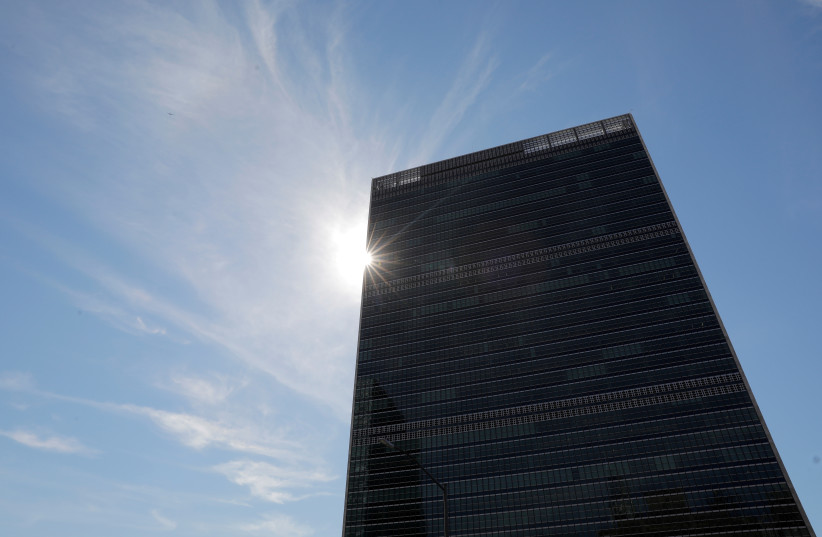US President Joe Biden called on Iran to return to the nuclear deal and said Israelis and Palestinians were still a “long way” from two-states, when he delivered his first high-level address to the UN General Assembly on Tuesday.
“We are working with the P5+1 to engage Iran diplomatically, to seek a return to the Joint Comprehensive Plan of Action. We are prepared to return to full compliance if Iran does the same,” Biden said.
He underscored, however, that the “United States remains committed to preventing Iran from getting a nuclear weapon.”
Since taking office in January, Biden has unsuccessfully sought to revive the 2015 Iran deal, which former US president Donald Trump’s administration exited in 2015. European Union-brokered talks in Vienna to restart the deal signed between Tehran and the six world powers – the US, China, Russia, France, Germany and Great Britain – were last held in June.
Iran said on Tuesday that talks would resume in a few weeks, the official Iranian news agency IRNA said.
Speaking hours later, Iranian President Ebrahim Raisi told the UNGA that Iran wants a resumption of nuclear talks with world powers to lead to the removal of US sanctions.
“The Islamic Republic considers the useful talks whose ultimate outcome is the lifting of all oppressive (US) sanctions,” Raisi said in his address, which was his first before the UNGA since his election in June.
US sanctions, imposed by Trump in 2018, “were crimes against humanity during the coronavirus pandemic.” Sanctions are the Americans’ new method of war with the world, Raisi added.
He swore that his country had no intention of developing nuclear weapons, stating that “nukes have no place in our defense doctrine and defense policy.”
Biden’s address dealt only briefly with Iran. He also made a few short comments about the Israeli-Palestinian conflict.
He voiced support for the two-state solution but recognized that we are “long way from that goal at the moment.”
“The commitment of United States to Israel’s security is without question and our support for an independent Jewish state is unequivocal, but I continue to believe that the two-state solution is the best way to ensure Israel’s future as a Jewish democratic state, living in peace, alongside a viable, sovereign and democratic Palestinian state,” said Biden. “We’re a long way from that goal at this moment, but we must never allow ourselves to give up on the possibility of progress.”

Biden also dedicated parts of his speech to defend the US’ chaotic withdrawal from Afghanistan.
“I stand here today for the first time in 20 years with the United States not at war. We’ve turned the page,” Biden said. “All the unmatched strength, energy, commitment, will and resources, our nation is now fully and squarely focused on what’s ahead of us, not what was behind.”
“We’ve ended 20 years of conflict in Afghanistan, and as we close this period of relentless war, we’re opening a new era of relentless diplomacy,” said Biden.
Speaking about the aftermath of the withdrawal from Afghanistan, Biden said that “those who commit acts of terrorism against us will continue to find a determined enemy in the United States.”
“The world today is not the world of 2001, though,” Biden noted. “And the United States is not the same country we were when we were attacked on 9/11, 20 years ago. Today, we’re better equipped to detect and prevent terrorist threats and we are more resilient in our ability to repel them and to respond,” he said.
“We’ll meet terrorist threats that arise today and in the future with a full range of tools available to us, including working in cooperation with local partners, so that we need not be so reliant on large-scale military deployments.”
US military power “must be our tool of last resort not our first and should not be used as an answer to every problem we see around the world,” Biden explained as he laid out his vision of America’s place in the international community.
He spoke in particular about the importance of global partnerships as he called on world leaders to join forces “to build a better future” and to address joint challenges such as climate change and COVID-19.
Speaking about the pandemic, Biden said that many of the world’s greatest concerns “cannot be solved or even addressed through the force of arms.”
“Bombs and bullets cannot defend against COVID-19 or its future variants,” he said. “To fight this pandemic, we need a collective act of science and political will. We need to get shots in arms as fast as possible and expand access to oxygen, tests, treatments to save lives around the world.”
He called on world leaders to work together to address climate challenges. “To keep within our reach the vital goal of limiting global warming to 1.5° Celsius, every nation needs to bring their highest possible ambitions to the table when we meet in Glasgow for COP26,” he said.
Reuters contributed to his report.
